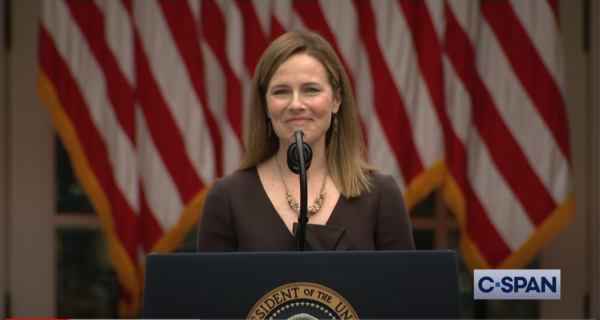
The gun prohibition lobby is pulling out all stops to oppose the confirmation of Judge Amy Coney Barrett to the U.S. Supreme Court, which suggests anti-gunners are terrified that if she succeeds the late Justice Ruth Bader Ginsburg, the high court may begin taking up Second Amendment cases and render extremist gun control laws unconstitutional.
Hysteria seems to have reached a fever pitch with an Op-Ed in USA Today by anti-gunner Shannon Watts, founder of Moms Demand Action for Gun Sense in America.
A new Rasmussen poll shows an overwhelming majority of likely voters believe Barrett will be confirmed by the Senate.
The Second Amendment Foundation issued a statement praising the Barrett nomination.
“Judge Barrett is eminently qualified to take a seat on the highest court in the nation,” said SAF founder and Executive Vice President Alan M. Gottlieb. “Our research shows her to be an outstanding candidate and we hope the U.S. Senate can quickly vote to confirm her.”
In 2017, the American Bar Association’s Committee on the Federal Judiciary found Amy Coney Barrett to be “well qualified” for a judgeship with the U.S. Court of Appeals for the Seventh Circuit. According to the Senate Republican Communications Center, former colleagues of Judge Barrett at the Notre Dame Law School consider her a “brilliant teacher and scholar” with an “absolute dedication to the rule of law.”
However, in an email blast, anti-gun billionaire Michael Bloomberg’s Everytown for Gun Safety declared Judge Barrett “is a gun rights extremist who has no place on the Supreme Court.”
That comment was followed up with this assertion: “If the U.S. Senate confirms Amy Coney Barrett, the Supreme Court could adopt the gun lobby’s radical views of the Second Amendment, putting hundreds of life-saving gun laws—like background checks on all gun sales—at risk.”
Everytown’s message also argued, “In a case in 2019, Amy Coney Barrett showed that she believes people convicted of serious felonies should be able to own firearms, yet shouldn’t be allowed to vote.”
But according to a Senate Republican fact sheet detailing Judge Barrett’s qualifications, it is noted, “In Kanter v. Barr, 919 F.3d 437 (7th Cir. 2019), Judge Barrett demonstrated that she understands and appreciates the need to look to the Founders to understand the full scope of Second Amendment rights. She dissented from an opinion upholding federal and state bans on firearm ownership by a man who had pleaded guilty to one count of mail fraud for falsely representing that certain therapeutic shoe inserts were Medicare-approved. While recognizing the undeniably compelling interest in protecting the public from gun violence, she concluded that a blanket ban on owning firearms by nonviolent felons is unconstitutional. Judge Barrett dug into the historical record and concluded that the Second Amendment, as understood by the average citizen at the time of the Founding, could not support such a ban; Founding-era legislatures stripped people of the right to bear arms when they judged it necessary for the public safety, not merely because they were felons.”
One count of mail fraud may or may not be a “serious felony,” but it was not a violent felony. At one time, the federal Bureau of Alcohol, Tobacco, Firearms and Explosives conducted restoration-of-rights investigations, allowing people convicted of non-violent felonies to regain their gun rights. The law still exists, but thanks to Capitol Hill anti-gunners, funding has not been available for those investigations for more than 20 years.
The Seattle-based Alliance for Gun Responsibility, another billionaire-backed gun prohibition lobbying group, insisted, “The Senate must honor Justice Ginsburg’s last wish that she not be replaced until the next president is installed.” Backers of President Donald Trump chuckle that such a wait could last four years with a Trump victory in November.
But a look farther down the Alliance message reveals their real fear.
“The Supreme Court has enormous power to shape the future of our country, including by upholding or undermining laws passed directly by voters, like Initiative 1639,” their message states. “Voters deserve to have a say in the future of the court.”
But voters did have a say in that future, according to SAF’s Gottlieb.
“When Donald Trump took office, one of his most important campaign pledges was to bring balance to the federal court system, nominating judges, and Supreme Court justices, with solid constitutional credentials,” he said.
It was the prospect of Hillary Clinton appointments to the federal courts that brought millions of gun owners and Second Amendment activists to the polls in 2016. Whether that will happen in November remains to be seen, but Gottlieb noted Trump has “certainly kept his promise, and in Judge Barrett, we think the president has offered a nominee with impeccable credentials.”
In addition to being anti-gunners, Seattle’s Alliance appears to also reveal itself to be no friend of rank-and-file law enforcement. Their message continued, “As our communities confront the challenges of the coronavirus, economic turmoil, and continued gun violence and police brutality, our elected officials should put craven political games aside and build on Justice Ginsburg’s legacy of fighting for a more inclusive and just country.”
But Barrett noted in the 2018 case of U.S. v. Watson that “mere possession of a gun does not give police the right to stop and investigate someone for potential wrongdoing,” the Senate Republican fact sheet said. “Police blocked and searched a man’s car based on an anonymous tip that a group of individuals possessed guns in a parking lot. But, she explained, under the Fourth Amendment, an officer cannot stop someone to investigate potential wrongdoing without reasonable suspicion that criminal activity may be afoot. Exercising one’s Second Amendment right to possess a firearm is not a crime. Thus, she explained, ‘citizens should be able to exercise the constitutional right to carry a gun without having the police stop them when they do so.’”
Hearings on Judge Barrett’s nomination begin Oct. 12. There are hints the confirmation process could be completed in time for a Senate vote by Oct. 26.